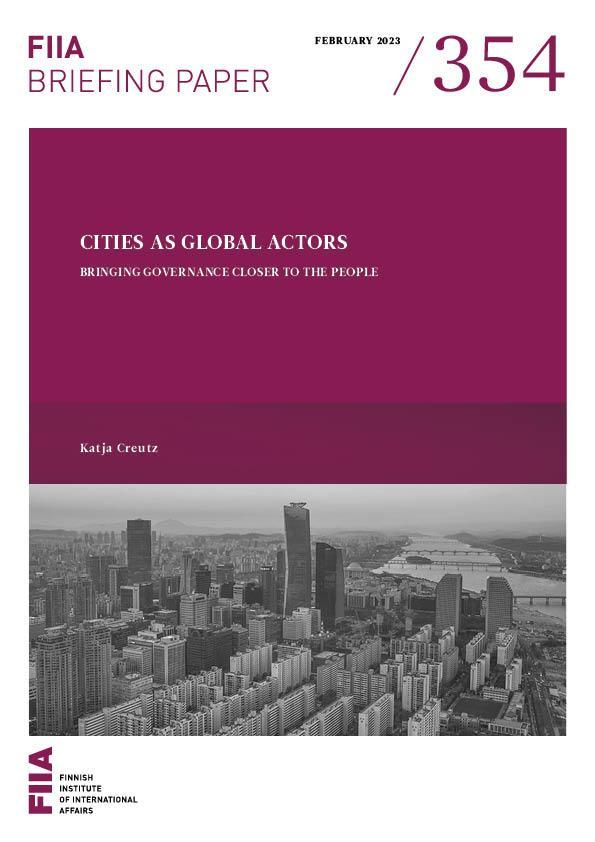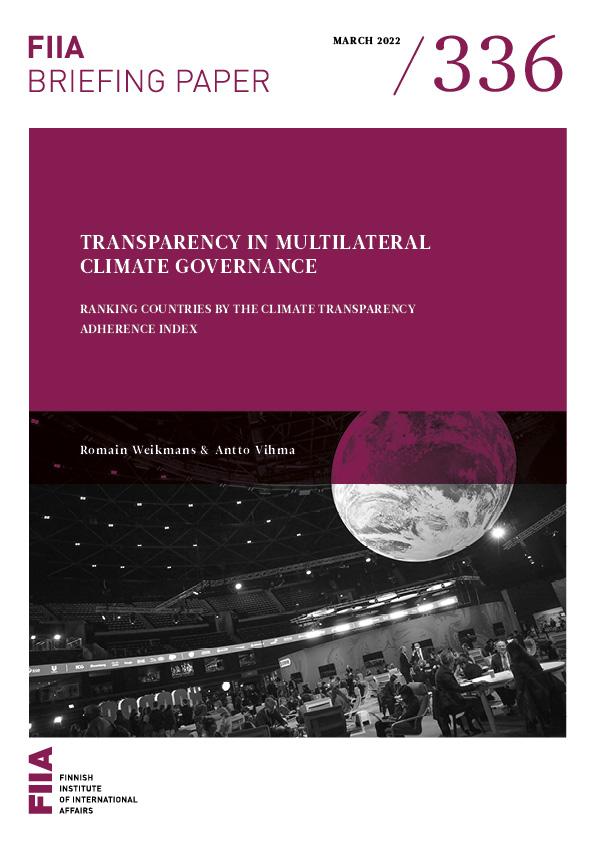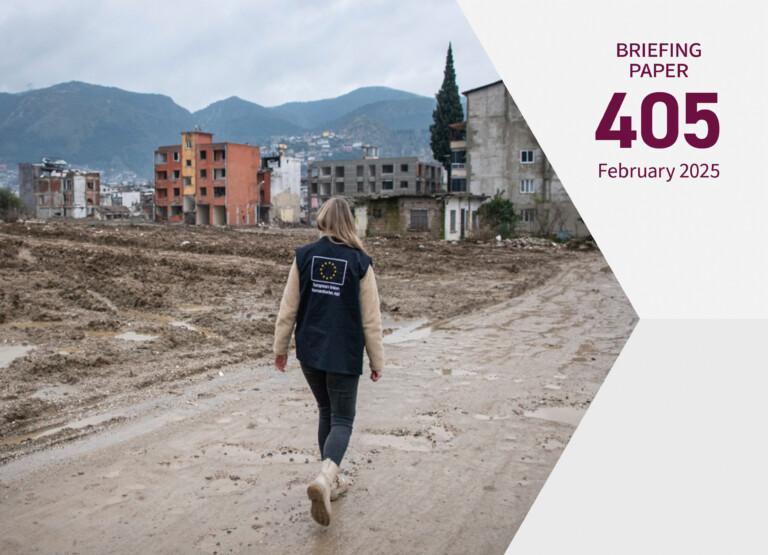
Globalization and extensive urbanization worldwide have brought cities to the forefront of global governance in a multilateral system designed and created for states.
Cities have come to exercise power due in part to the inadequacy or ineffectiveness of inter-state action, but also because their democratic nature and immediate connection to the population make them legitimate actors.
Cities are also home to many problems of a global nature, such as greenhouse gas emissions, pandemics, and sustainability. This makes them uniquely situated to address these challenges.
City diplomacy has become a prevalent feature in many global policy issues, ranging from climate change to development cooperation. The primary tool through which cities act is networking, with hundreds of global city networks pursuing the interests and values of their constituencies.
By demanding a seat at the table where global affairs are decided upon, cities challenge and complement the state-based international order, in addition to which they stretch the basic concepts and constructs of both international relations and international law.
Introduction
Studies on international relations and international law have traditionally devoted little attention to cities as transnational or global actors. However, cities are increasingly becoming a recognized part of the realm of actors that – alongside states – contribute to global governance of common challenges.
To give a recent example, Russia’s aggression against Ukraine has not only been condemned and addressed by states, but also cities throughout Europe. European cities have been vital in receiving millions of refugees, providing humanitarian aid, condemning the war in demonstrations and through their leaders, and in mobilizing reconstruction through city-to-city partnerships, among many other things. In a joint call by 300 European Mayors, issued in March 2022, Russia was urged to create humanitarian corridors for Ukrainians, the EU was requested to stop all trade with Russia and Belarus, and Europeans were asked to show solidarity with Ukrainian refugees in need of shelter and relocation.
In comparison with other actors, cities have special agency as they largely form part of the state hierarchy both in terms of constitutional law and international law, yet they resemble non-state actors such as non-governmental organizations or private corporations by having political agendas and leverage of their own. Their self-standing value is in the ascendant, as cities and their leadership demonstrate an unprecedented appetite and assertiveness in partaking in global governance.
This Briefing Paper discusses the changing role played by cities transnationally as actors involved in global governance. It also seeks to increase awareness of the global rise of cities. The paper starts by exploring the empowerment of cities, followed by a discussion on the means through which cities exercise their power, as well as relevant policy sectors that constitute important parts of their global agenda. Finally, the Briefing Paper ponders the implications for the state-dominated international order.
The global empowerment of cities
Cities worldwide have been on the rise for decades during the American-led ‘unipolar moment’, with liberalism at the vanguard. This holds true especially for what sociologist Saskia Sassen famously labelled The Global City in 1991, arguing that as a result of globalization, cities such as New York, London and Tokyo serve as hubs for the global economy. Indeed, globalization is seen as a primary driver of the increased significance of cities. It has entailed the influx of flows of foreign investments, businesses, goods, workers, and ideas into cities, thereby making them the very site where globalization happens.
Another global trend behind the rise of cities is urbanization, which has skyrocketed with almost 6 out of 10 living in cities worldwide. According to the United Nations Conference on Trade and Development (UNCTAD), 79.5% of people in developed economies lived in cities in 2021.[1] Admittedly, urbanization is strongest in North America with 83% being residents of cities, and in the European Union with a corresponding rate of 75%,[2] but overall the urbanization trend is similar around the globe. The biggest cities are often located in Asia with Jakarta, Delhi, Beijing, Seoul and Tokyo all having over 10 million inhabitants. In recent years, urbanization has been most noticeable in Asia and Oceania, and it has been predicted that Sub-Saharan Africa along with South Asia will witness rapid urbanization in the coming years.[3] The Covid-19 pandemic was for a while thought to be reversing the movement of populations from rural to urban areas, yet the permanency of such a trend is debatable.
Globalization and urbanization go hand in hand with another recurring phenomenon taking place since the 1980s, namely decentralization or denationalization, if you will. States have lost, intentionally and unintentionally, absolute control over their territory to a broad range of actors when it comes to politics, economics and social activities, also in the global arena. [4] Nationally, the transfer of powers and responsibilities from central government to the local level – a development embraced by cities themselves – made sense due to cost-effectiveness and accessibility, but also due to the inherent democratic nature of cities.
While the three above-mentioned phenomena explain how cities have been able to strengthen and seize power, the question arises as to why cities have seized the opportunity to engage in global affairs. One reason lies in the position of cities between the state and its citizens. The pressure from citizens is urgently felt in cities, as are the consequences of global challenges that either originate in cities or become tangible in them.
For example, cities are the main polluters and producers of greenhouse gas emissions, they are places where economic inequality is visible and transnational crime breeds, and they are at the front line in fighting pandemics. Cities are the places in which individuals’ basic rights and services are realized. It is the city, or a comparable local government, which turns health, education, housing, or environmental protection into reality.
Another reason for cities to grasp power is that they may represent different values or pursue different policies from the state. What is decided at state level is not always seen to correspond to the needs of cities. This became visible, for instance, in the reaction of major US cities when the then President Donald Trump in June 2017 announced the withdrawal of the United States from the 2015 Paris Climate Agreement. In response, hundreds of mayors in the US reaffirmed their commitment to the Paris Agreement and disavowed Trump’s denial of global warming. US cities have also sought to promote gender equality through the adoption of ordinances and resolutions declaring the intent to commit to the Convention on the Elimination of All Forms of Discrimination against Women (CEDAW), as the federal government is one of the few in the world that has declined to ratify the convention.
City diplomacy and other means of influence
City diplomacy refers to the ways in which cities advance their interests internationally with respect to political actors. Cities have developed several different means of influencing the global agenda and decision-making, especially through networking with other cities. This can take place bilaterally, multilaterally, nationally, regionally, or transnationally. The majority of city networks function at the national level,[5] but it is noticeable that there are more than 200 city networks acting globally.
Traditionally, cities engage in bilateral cooperation with other cities, and many have ‘friendship’ cities in other countries. This interaction has expanded rapidly to even larger networks, either geographical or issue-based, which testifies to the fact that networking is the primary tool through which cities act. On the one hand, networking enables city-to-city cooperation on concrete issues, while on the other hand, it enables cities to pursue their interests with a joint voice on the international stage, leaving them more powerful than acting alone. Many UN organizations, such as the UN-Habitat, the World Health Organization (WHO), and the UN Educational, Scientific and Cultural Organization (UNESCO), were crucial in taking city networking to the next level with institutional features, including secretariats of their own.[6]
Part of city diplomacy involves having offices for foreign affairs or international relations at home. Cities also promote their interests by opening representation and appointing ambassadors abroad, as well as drafting implementation strategies on how to approach foreign powers. For instance, several cities have individual representation in Brussels with the aims of monitoring EU decisions and legislation, promoting the values of their constituencies, or providing information and recommendations. When it comes to strategies on external relations, for example, the 21 biggest cities in Finland have a network in which they coordinate their China policies. This cooperation aims at advancing the cities’ interest in China, but it is also explicitly spelled out that it may bring added value to Finnish national-level cooperation and Sino-Finnish relations.[7]
Imitating states as subjects of international law is also among the tools used by cities in demonstrating leverage. It is not uncommon to see city networks informally committing to treaties or other international legal instruments, or seeking to join international organizations. But it is not only cities that one-sidedly attempt to gain access to international institutions; due to their increased leverage they are welcomed into the institutional structures and activities of international organizations, too. There are also reasons of legitimacy behind the interest that international organizations have shown in cities. Local governments are mostly elected, and they have local knowledge of and a connection to the population, turning them into both effective and legitimate partners in the eyes of international organizations.[8]
The increased interaction between international organizations and cities is exemplified in the creation of a UN Special Envoy on Cities and Climate Change. Other notable examples of cities’ involvement include the drafting of the Global Compact on Migration in 2019, and the World Bank concluding legal agreements on urban development projects directly with cities. The result is a pragmatic relationship where cities are relied upon directly by allowing participation in policymaking and decision-making, the implementation thereof, and by recognizing them as targets of the policies of international organizations.
While city diplomacy and international engagement in global affairs is increasingly prevalent, there are obstacles standing in the way of maximizing the potential that international engagement can have. These mostly relate to ensuring the necessary capacity, expertise and funding for cities as global actors. Accordingly, more educated personnel are needed beyond the interest of single individuals in pursuing city diplomacy, in addition to which a shortage of funding is identified as a constraint upon city diplomacy.[9]
Global agenda of cities
There are many policy issues that are at the heart of cities’ global action, partly because they relate to cities naturally, and partly because interstate cooperation in these policy sectors has been inadequate or ineffective as a consequence of rigid structures or outlooks. A study on city diplomacy published in 2021 revealed a belief among city leaders that cities have a greater impact on global challenges than national governments.[10]
International organizations view cities as natural partners that are often more prepared than states to implement policies that help international organizations to fulfil their mandates; at the same time, cooperation with international organizations helps cities to get a seat at the table as multilateralism is being made more inclusive. As a consequence, cities have become recognized global actors in many policy sectors, such as migration, global health, climate change, sustainability, human rights, and social justice. Yet cities also play a part in development cooperation and counterterrorism, among other things.
Climate change represents one policy area in which the agency of cities is widely recognized due to the alleged governance gap, as states have been unable to effectively undertake action. Cities have created networks in their fight against climate change, such as the well-known C40 network composed of leading cities from every continent in the world, ranging from Accra in Ghana to Guangzhou in China. The network aims, among other things, at scaling up climate action through halving the emissions of the member cities in a decade. The C40 cities directly represent 20 per cent of global GDP and 582 million people, and the network reports that several of its member cities have already reached peak emissions.
While cities, along with other subnational actors, are seeking to increase and formalize their role in international climate governance, recent reports suggest that cities, too, fail in delivering their pledges to reduce emissions. According to a recent UN high-level expert report on net zero emission pledges and non-state entities, the actions of cities also suffer from vague or no reporting mechanisms, leaving room for improvement, inter alia, in setting intermediate targets.
Another field in which cities around the world are active is human rights promotion and protection. There are ‘Human Rights Cities’, which have generally declared their abidance by the 1948 Universal Declaration of Human Rights. The cities have agreed to the so-called Gwangju Guiding Principles for a Human Rights City in that they place the individual at the centre of their activities, mainstream human rights in their governance, and promote values such as non-discrimination, social inclusion and cultural diversity, as well as participatory democracy.
Cities are increasingly considered the most suitable actors for turning human rights into reality, while simultaneously shifting human rights away from a legalistic approach to one of concreteness.[11] Besides protecting the rights of their inhabitants, they sometimes make broader human rights commitments than their national state, or seek to pressure the state to accept specific human rights obligations. For example, the Child Friendly Cities Initiative launched in the United States by UNICEF USA, to which cities such as San Francisco and Houston, Texas have signed up, builds on the Convention on the Rights of the Child – a human rights treaty that the US federal government has not acceded to.
Sustainability is another policy sector in which cities are recognized actors, in particular due to the 17 UN Sustainable Development Goals (SDGs) adopted in 2015. One of the goals (SDG number 11) addresses cities directly as crucial for sustainability, but cities are important partners in the realization of the other aims of the SDGs as well, such as quality education and inclusive societies.
One prominent global network active in urban sustainability is the Local Governments for Sustainability (ICLEI), which encompasses 2,500 local and regional governments covering over 20% of the global population, with numerous secretariats and offices spanning the globe. The network has developed five pathways through which urban sustainability is promoted, ranging from circular development to equitable and people-centred development. For instance, it is within ICLEI that the Circular City of Turku in Finland collaborates with its Japanese peers, Obuse and Nagano, with the aim of putting concepts into practice.
Implications for the state-based international order
The rise of cities has obvious effects upon the international order, including international law, both in practical and theoretical terms. Whereas cities have slowly been included in the discourses and analyses of international relations and international law, many fundamental concepts and understandings remain resistant to change as cities are considered to challenge or loosen disciplinary building blocks. This means that while the agency of cities is mostly accepted as an empirical matter, there is hesitance about embedding them formally, for example within concepts such as sovereignty or legal subjectivity. Instead, preferred options have been to develop softer means of regulation and responsibility for cities, such as standard-setting and monitoring mechanisms, that fail to put them formally on a par with states.
While disciplinary boundaries are difficult to penetrate, there have been specific viewpoints, or strategies if you will, that are more willing to recognize the role of cities. One of these is connectivity, or ‘connectography’ as expert on geopolitics and globalization Parag Khanna calls it, emphasizing the role of mega-cities among other actors in the construction of global networks. Positing that sovereignty has been overtaken by connectivity, new and more pluralistic ways of understanding global ordering are being developed as traditional ways of understanding the world appear to be lagging behind. Another approach seeking to integrate the global and the local is ‘glocalism’ or ‘glocalization’, which touches upon the multidirectional contacts between local and global, as well as the way they interrelate.
While the durability of the advance of cities globally is unclear, as is the extent to which it will eventually change the international order, it has forced practitioners and scholars alike to recognize the potential that cities hold for major transformation as regards the range of actors that decide on matters affecting the future worldwide. Cities are an important ingredient, among many others, in the shift from an ‘international’ order to a ‘global’ one, and one in which global governance is brought closer to the people.
Interestingly, the actorness of cities is also commonly coupled with specific policy agendas as cities are viewed as benign actors stressing openness internationally, a cosmopolitan worldview, and liberal values in contrast to states that may have authoritarian leaders, foster populist nationalism, and pursue economic protectionism.[12] It is precisely the possible pursuit of diverging objectives between cities and states that may create tensions and attest to cities’ challenging potential in relation to states, perhaps more so than with respect to any other political entity.[13]
While the question of shifting authority in global governance is much discussed, the dependency between national and local governments is still often pointed out. With respect to the fight against climate change, for example, it is set forth that initiatives introduced by cities build on agreements and regimes created by states.[14] Indeed, the ICLEI network has concluded that “local and subnational governments… cannot meet the scale of the challenges to sustainable development forecasted within the 2030 agenda without the support and enabling frameworks from national governments and international agencies”.[15] Accordingly, it can be debated whether the strengthening of cities actually shifts authority or power away from states, or merely reconfigures statal power. For example, the US Department of State has a Special Representative for Subnational Diplomacy with the aim of “supporting national security priorities by integrating local ideas into foreign policy and fostering connections among cities, municipalities, and communities in the United States and abroad”.[16] An Act equalizing cities and other local actors with federal offices in the field of foreign policymaking was nonetheless rejected by the US Congress.
Conclusions
Cities have indisputably gained a seat at the table where global affairs are being discussed and decided upon. The rise of cities nevertheless occurred during the ‘unipolar moment’ of American hegemony in which liberalism reigned, leaving it open as to what extent cities can thrive and exercise leverage in a world marked by major power competition and regression in many aspects, including democracy and human rights. Moreover, the increased influence of cities is often juxtaposed with states, although cities largely rely on states for critical physical or legal infrastructure, not to mention funding.
With the future unravelling, what is clear, however, is that global challenges of our time, including climate change, sustainability, migration or pandemics, cannot be managed by states alone. In order to be tackled, they need the assistance and involvement of a broad range of other actors, among which cities are more and more vital. Due to their activities in many policy sectors, it is imperative that the role played by cities is both understood and appreciated, while insights, whether practical or theoretical, are further developed. Only then can one fully grasp the changing dynamics between the different levels of participation and decision-making, namely global, statal and local.
Endnotes
[1] UNCTAD (2022) “Total and Urban Population.” https://hbs.unctad.org/total-and-urban-population/.
[2] Statista (2023) “Share of Urban Population Worldwide, by Continent.” https://www.statista.com/statistics/270860/urbanization-by-continent/.
[3] UNCTAD 2022; Office of the Director of National Intelligence (2021) “Global Trends 2040”, March 2021. https://www.dni.gov/index.php/gt2040-home/gt2040-structural-forces/demographics-and-human-development.
[4] Blank, Yishai (2006) “The City and the World”, Columbia Journal of Transnational Law 44(3): 868–931, 883; Amen, Michael Mark, Noah J. Toly, Patricia L. McCarney and Klaus Segbers (2011) “Introduction.” In Cities and Global Governance: New Sites for International Relations, edited by Michael Mark Amen, Noah J. Toly, Patricia L. McCarney and Klaus Segbers. Farnham: Ashgate, 1, 2.
[5] Acuto, Michele, Mika Morissette and Agis Tsouros (2017) “City Diplomacy: Towards More Strategic Networking? Learning with WHO Healthy Cities.” Global Policy, 8(1): 14–22, 16.
[6] Kosovac, Anna, Kris Hartley, Michele Acuto and Darcy Gunning (2021) “City Leaders Go Abroad: A Survey of City Diplomacy in 47 Cities”, Urban Policy and Research 39(2): 127–142, 128.
[7] Suomen Tietotoimisto (2018) “C21 kaupungit vahvistavat Kiina-yhteistyötään”, 30 August 2018. https://www.sttinfo.fi/tiedote/c21-kaupungit-vahvistavat-kiina-yhteistyotaan?publisherId=60590288&releaseId=69516350.
[8] Cogan, Jacob Katz (2021) “International Organizations and Cities.” In Research Handbook on International Law and Cities, edited by Helmut Philipp Aust and Janne E. Nijman. Cheltenham: Edward Elgar, 158–172, 160.
[9] Kosovac et al. (2021), 138–139.
[10] Ibid., 137.
[11] Oomen, Barbara M. (2016) “The Promise and Challenges of Human Rights Cities.” In Global Urban Justice. The Rise of Human Rights Cities. Edited by Barbara Oomen, Martha F. Davis and Michele Grigolo. Cambridge: Cambridge University Press, 1, 4.
[12] Curtis, Simon (2021) “An International Relations Perspective.” In Research Handbook on International Law and Cities, edited by Helmut Philipp Aust and Janne E. Nijman. Cheltenham: Edward Elgar, 321–328, 326.
[13] Ibid., 321.
[14] Hickmann, Thomas (2017) “The Reconfiguration of Authority in Global Climate Governance”, International Studies Review 19: 430–451, 431.
[15] ICLEI (n.d.) “Cities and the Sustainable Development Goals”, ICLEI Briefing Sheet – Urban Issues No 2., 2. https://www.local2030.org/library/232/ICLEI-Briefing-Sheets-02-Cities-and-the-Sustainable-Development-Goals.pdf.
[16] US Department of State (n.d.), “The Special Representative for Subnational Diplomacy. Our Mission.” https://www.state.gov/bureaus-offices/under-secretary-for-economic-growth-energy-and-the-environment/the-secretarys-office-of-global-partnerships/the-special-representative-for-subnational-diplomacy/.












